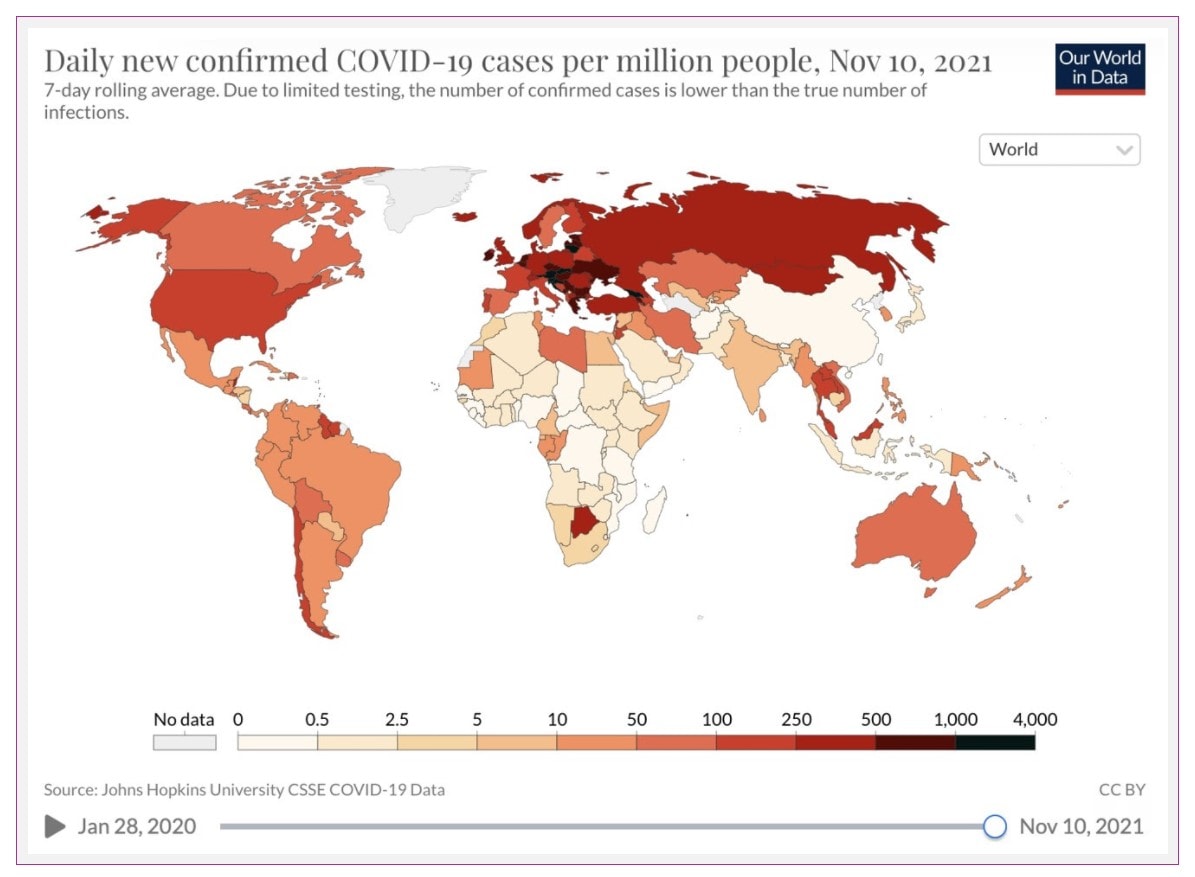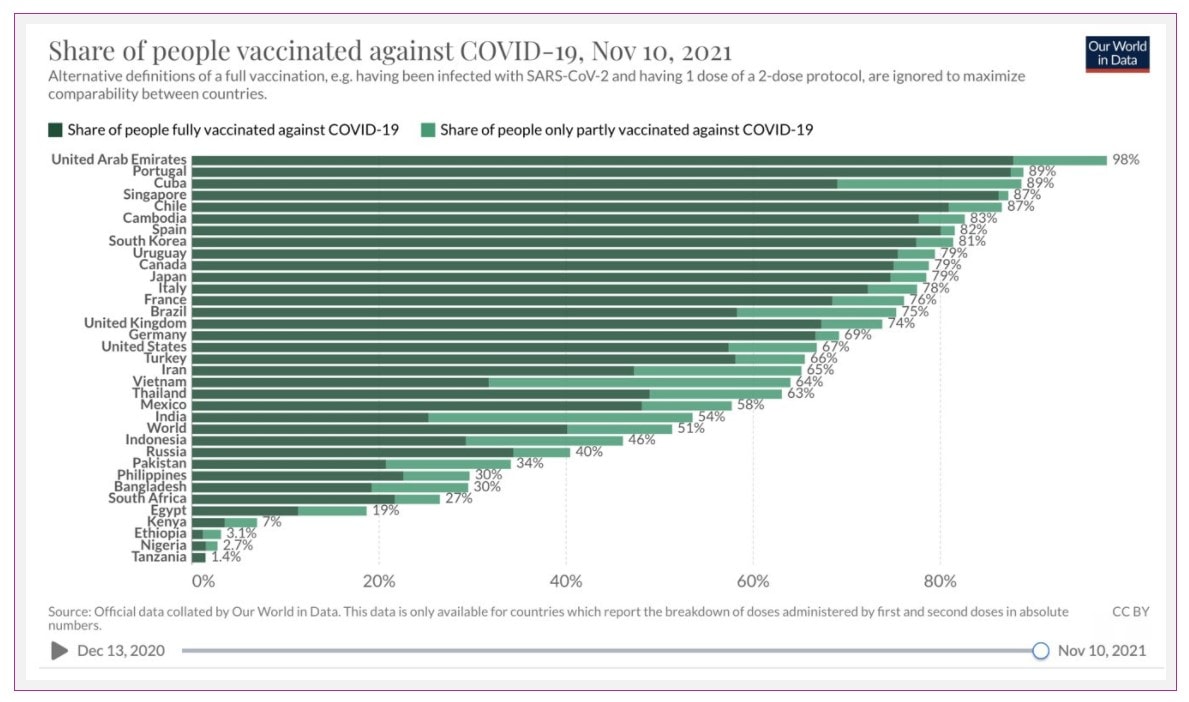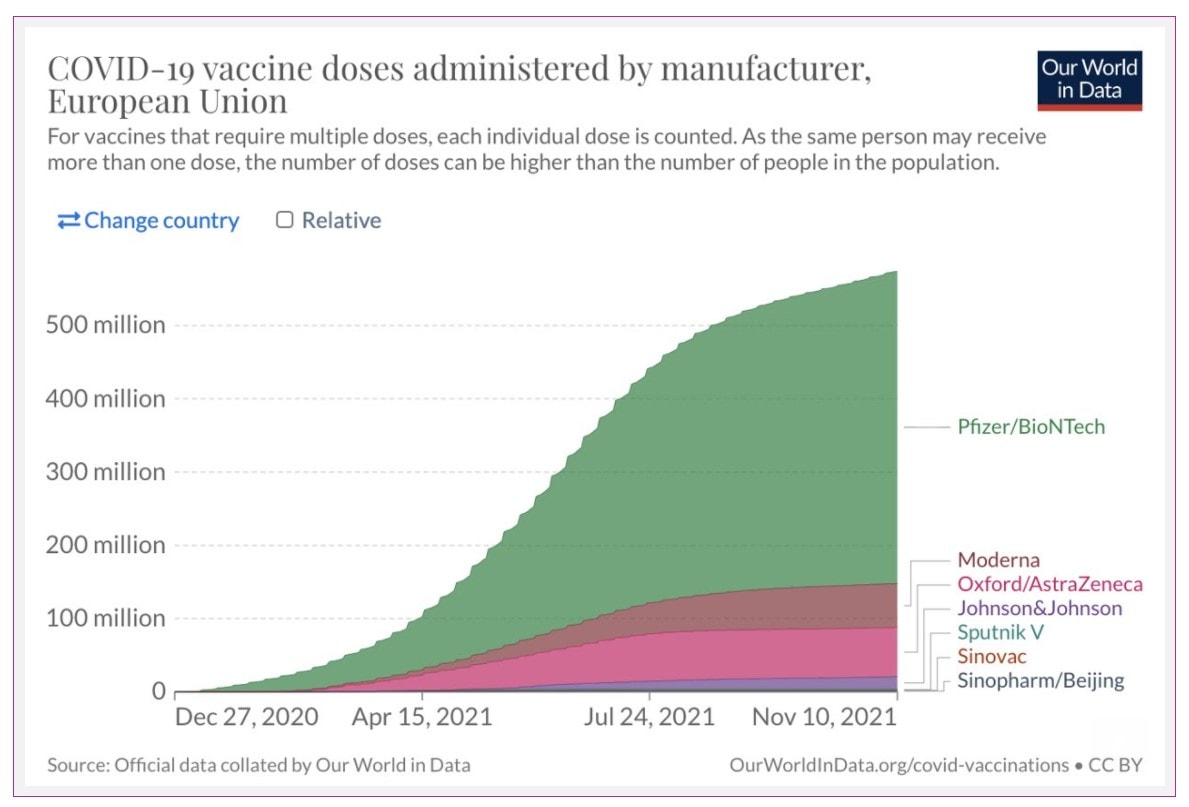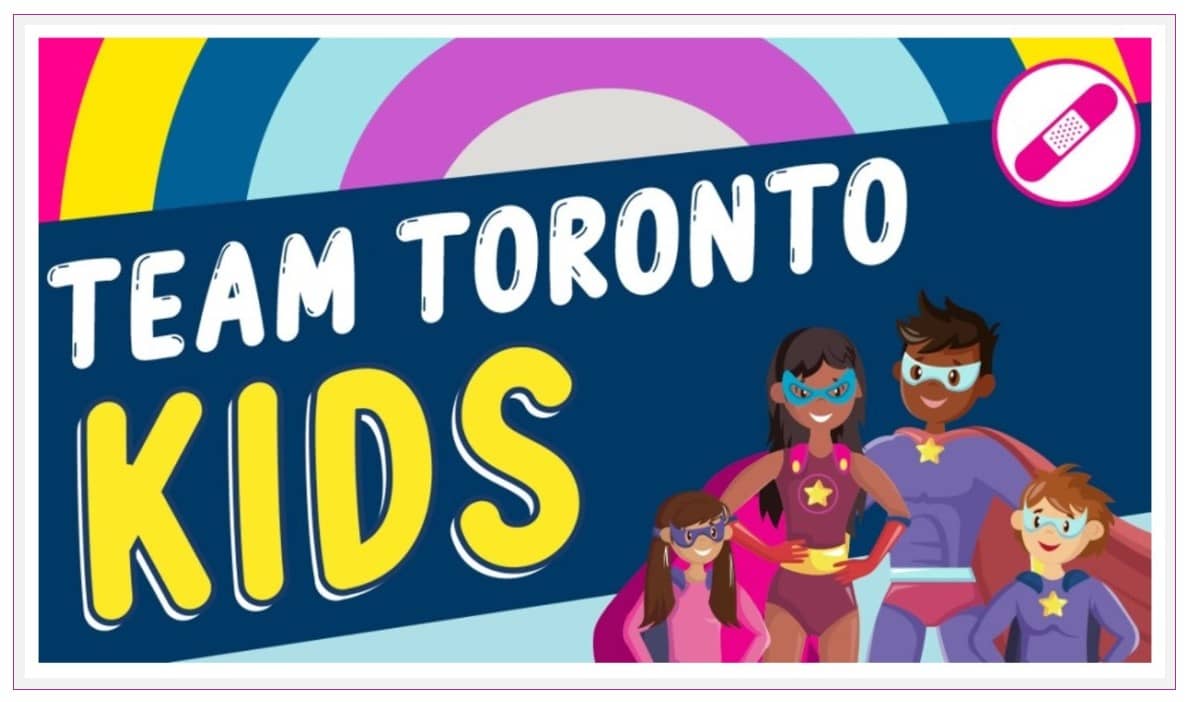Hello friends!
I hope you had a wonderful and relaxing weekend.
As we do each week, we’ll review the bad news and the good news. Then, I will answer some of the most common questions I was asked this week and end on my silver lining.
What is the bad news?
Over 250 MILLION cases of COVID-19 have been reported worldwide, with almost 5.1 MILLION deaths.
In Canada, we have seen over 1.7 million cases with over 29,000 deaths.

Two new Delta strain mutations have been identified. However, they are not yet variants of concern, and more data is needed to determine if these strains are more transmissible. The best way to prevent new and dangerous variants: avoid the rapid spread of the virus. Public health measures and vaccination help accomplish this.
Last week Statistics Canada reported more than 19,000 Canadians died between March 2020 and July 2021 than would have been expected if it hadn’t been for the pandemic. While over 25,000 people died from the virus itself, the pandemic also delayed medical procedures, and we have seen a significant rise in substance use, which may be contributing to the higher number of deaths.
The COVID situation is worsening in Europe. The WHO reported last week that deaths rose 10% last week alone. Europe is the only region in the world where COVID-19 cases and deaths are steadily increasing. Nearly 2/3 of the world’s COVID infections are in Europe. The hardest-hit areas are Russia, Ukraine, and Romania.
Europe is evaluating whether to authorize the Pfizer and Moderna vaccines for kids aged 5-11. Pfizer is already approved for use in Europe for ages 12 and up.
What is the good news?
Almost 90% of eligible (12+) Canadians have received the first dose of a COVID vaccine, and over 85% are fully vaccinated.
Worldwide, over 7.4 BILLION doses have been given. 51% of the people in the WORLD have received the first dose, and 40% are fully vaccinated.

Health Canada approved boosters of the Pfizer vaccine for people over 18. Third doses are currently being given to high-risk individuals across the country.
In Ontario, the following groups qualify for a booster:
• Moderately to severely compromised immune system.
• Residents of high-risk retirement homes, long-term care homes, First Nations eldercare lodges, and elderly people living in congregate settings (five months after the second dose).
• Age> 70.
• Health-care workers and designated essential caregivers in congregate settings
• First Nation, Inuit, and Metis adults and their non-Indigenous household members (6 months after the second dose).
• Individuals who received two AstraZeneca doses or one Johnson and Johnson dose at least six months ago.
Over 1 million children aged 5-11 have received their first dose of the Pfizer COVID vaccine last week.
Questions of the week
Health Canada has not yet approved the Pfizer vaccine for kids. But many doses have been given in the United States already. Here are some of your most common questions this week. More questions about COVID vaccines in kids can be found in my last few newsletters. The Sick Kids COVID-19 Vaccine Consult Service is available as well.
`
Should children who are almost 12 years old or who weigh more get bigger doses?
No. Vaccine doses are based on age, not weight. Therefore, children who are nearly 12 or weigh more do not need bigger doses.
How many doses of the COVID vaccine will kids get?
In the Pfizer trials, two vaccine doses were given 21 days apart. However, two doses spaced eight weeks apart in adults seem to provide more robust and longer-lasting protection against COVID-19. The National Advisory Committee on Immunization (NACI) will recommend dosing and spacing regimens for the COVID vaccine in kids once Health Canada approves it. This is not known yet, but reports this week suggest this will happen in the coming weeks.
Are mRNA vaccines safe?
Yes. Many people think mRNA research is new, but it has been around since the 1960s. mRNA vaccines were tested in clinical trials, and regulatory bodies reviewed the results from these trials before the vaccines were used. More than 1.5 billion doses of the Pfizer COVID vaccine have been safely delivered around the world.

Is the Pfizer vaccine safe for kids?
A recent article in The New England Journal of Medicine evaluated the Pfizer COVID-19 vaccine for kids five-eleven. The paper presents the results of a phase one study examining the best dosage in children and ongoing phase two-three randomized clinical trials looking at the safety and efficacy of two 10 μg doses (the “kids’ dose”) of the vaccine given 21 days apart. The vaccine was safe, with no serious adverse events noted after more than two months of follow-up. In addition, the vaccine was 91% effective at preventing COVID-19 seven days + after the second dose.
What are the common side effects of the Pfizer mRNA vaccine in children?
Common side effects are the same as those in older kids and adults: fatigue, chills, muscle aches, joint pain, and a sore or red arm. However, most children in the trials had mild side effects or none at all. Side effects go away after a few days.
Are there any serious side effects from the vaccine?
The Pfizer vaccine trials in kids did not uncover any serious side effects. Severe allergic reactions are very rare. For every 1 million Pfizer vaccine doses given to people 12 years and older, there are 2-8 cases of anaphylaxis (0.0002 – 0.0008%). Kids with allergies to drugs, other vaccines, and foods can safely receive a COVID vaccine.
Myocarditis (inflammation of the heart) and pericarditis (inflammation of the sac around the heart) rarely occurs after receiving a COVID vaccine. These side effects are more common in young males after the second dose. These conditions are usually mild and are treated simply with rest and anti-inflammatory medicines like Ibuprofen. Importantly, myocarditis and pericarditis are far more likely to occur secondary to a COVID infection than from COVID vaccination.
Are there any long-term side effects from the mRNA in COVID vaccines?
Long-term side effects from these vaccines are not expected. Vaccine side effects typically occur within 1-3 weeks of vaccination. In addition, several mRNA vaccines have been studied since 2013, with no long-term side effects noted.
The body breaks down the mRNA from the vaccine within 2-3 days, and the spike protein degrades within 2-3 weeks. Though there have been reports on menstrual cycle changes, these are temporary, and these vaccines do not impact fertility or hormone levels, nor can they alter DNA.
What is Team Toronto Kids?
Team Toronto Kids is the city’s plan for vaccinating kids against COVID-19. Though Health Canada has not yet approved the vaccine for kids, Toronto is preparing for the 200,000 kids who live here to be vaccinated soon.

Toronto plans to roll out the vaccine in school clinics, doctors’ offices, large, fixed-site clinics, hospital and community-based clinics, and pharmacies. The goal is to make kids feel like superheroes for getting vaccinated.
Public health identified 30 neighborhoods for the first roll-out of school clinics. These locations are based on COVID case rates during the fourth wave of the pandemic, vaccination rates for 12–17-year-olds, and the percentage of residents in each neighborhood who fall below the low-income measure, the percentage who live in crowded housing, and the proportion of racialized individuals.
According to a news release, that analysis also included the percentage of residents in each neighborhood who fall below the low-income line, alongside the proportion of racialized people and the percentage of people living in crowded housing. You can see the list of neighborhoods here.
The silver lining of the week
We have been spending as much time as possible outside lately, trying to savor the weather as long as possible. On a trail run this weekend, I was struck by the incredible colors of the leaves, the smell, and the fall air. It may be getting colder, but there is much to appreciate!
Have a wonderful week!








![[Dr. Dina News] IMPORTANT UPDATE re. VIRTUAL CARE](https://drdina.ca/wp-content/uploads/2021/01/dr-dina-kulik-kids-and-virtual-care-1a-400x250.jpg)
![[Dr. Dina News] COVID-19 Vaccine for Infants and Young Children.](https://drdina.ca/wp-content/uploads/2021/04/dr-dina-kulik-kids-and-vaccines-400x250.jpg)
![[Dr. Dina News] COVID-19 Vaccine for Infants and Young Children.](https://drdina.ca/wp-content/uploads/2022/04/DRD-1-400x250.jpg)






